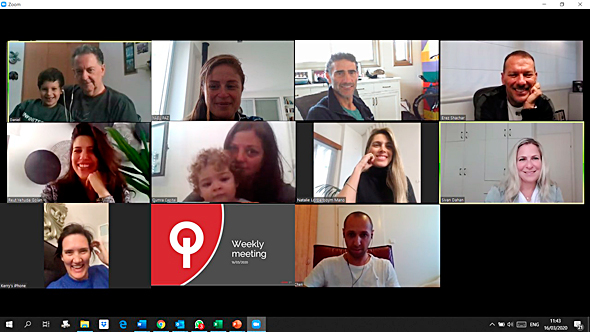
Corona Q&A
Israeli Industry is Well Positioned to Deal With the Corona Crisis, says Qumra Exec
Erez Shachar, managing partner at Tel Aviv-based venture capital firm Qumra Capital, answered seven questions about the Covid-19 crisis and its effects on the Israeli tech sector
How is your organization addressing the recent government directives?
We switched to working from home. We are spending hours a day on Zoom calls, including our weekly team meetings of 10 participants online for a full day.In what ways do you expect the coronavirus crisis to impact your organization in the coming months?
We are fully capable of continuing to work from home for several months ahead. We will need, however, to get used to having meetings through Zoom, and we will miss our weekly lunch meetings. Other than that, we are all buckled up and have access to all of our data from home. Zoom, Slack, and WhatsApp are proving to be invaluable work tools. How do you see the coronavirus crisis impacting the Israeli tech sector? There is no doubt that the global economic crisis sparked by the coronavirus will have an adverse impact on the Israeli sector, but I believe that we are well-positioned as an industry to deal with the crisis. In the recent decade, the Israeli tech sector moved almost exclusively to industries that are virtual in nature. We have very little hardware companies, which are dependent on a physical supply chain. Most of the Israeli software companies are now SaaS companies, which need little to no on-site integrations, or physical customer visits. Israeli tech companies’ sales are mostly done through digital funnel conversion, which means that customers buy their products and services online, without the need to meet anyone from the company, or through sales organizations that communicate with customers mainly by phone and chat. As a result of this fundamental change in the Israeli tech industry, I believe that the adverse impact would be significantly smaller on the tech sector, and it will be the first to bounce back and recover. Having said that, softening global demands for services and products, business disruptions caused by working from home, and strict travel restrictions will undoubtedly impact all business sectors, and we should prepare ourselves for a long winter. I believe the agility and adaptability of Israeli tech will prove to be a big asset in dealing with market hardships.
What can be done to minimize the damage?
Cash runway is the key to surviving this crisis. Most Israeli tech companies are still not profitable and have for years focused on growth at the expense of profitability. As of today, the cash runway has become a strategic asset for survival. Companies that come out of this crisis standing will be the winners of the market tomorrow. Fundraising will become more scarce, and preserving cash from operational sources would be key.
What are the top three rules to follow to endure the crisis?
Don’t panic. Rebudget realistically. Elongate your cash runway as much as possible, ideally above two years.Do you believe the coronavirus pandemic will have a lasting impact on social, economic, and cultural norms?
Most probably. Any major crisis leaves a lasting impact, and we learn different lessons from each. It would be interesting to see if the work from home environment and travel restrictions would turn into mainstream norms in the future. The need for constant travel in the tech market has never been questioned, even though it has a huge economical and environmental impact. If the current restrictive environment lasts a long while, and new work habits are tested in real life, maybe these habits would become the norm after the restrictions have been lifted. In Israel, I am already noticing that people have learned to stand in line, and give space to one another. If we can adopt that as a new cultural norm, it would be a small miracle.What are your top 3 pieces of advice to your portfolio companies at this time?
Reassess your plans. Be conservative in your assumptions, and adjust your cost structure to your new conservative plans. If things are proving to be better, it would be easy to adjust costs upwards.
Cash is king. Cash runway is the most strategic asset at your disposal.
Don’t worry about missing opportunities, just make sure you don’t miss out on your core business.
